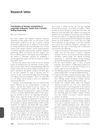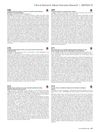 8 citations,
January 2020 in “Skin appendage disorders”
8 citations,
January 2020 in “Skin appendage disorders” Saw palmetto supplements may modestly improve hair regrowth with few side effects, but more research is needed.
 2 citations,
April 2019 in “Acta medica Philippina/Acta Medica Philippina”
2 citations,
April 2019 in “Acta medica Philippina/Acta Medica Philippina” People with alopecia areata often have lower vitamin D levels than healthy people.

Good nutrition may help prevent premature hair graying.

Eclipta alba L. (Urang-Aring) can help treat hair loss.
 March 2024 in “International journal of life-sciences scientific research/SSR Institute of International Journal of Life Sciences”
March 2024 in “International journal of life-sciences scientific research/SSR Institute of International Journal of Life Sciences” PCOS has many symptoms, with high androgen levels being the most common.
 January 2022 in “Acta dermatovenerologica Alpina, Pannonica et Adriatica (Tiskana izd.)”
January 2022 in “Acta dermatovenerologica Alpina, Pannonica et Adriatica (Tiskana izd.)” Uncombable hair syndrome causes frizzy hair and can affect the nervous system, eyes, and ears, often co-occurring with other hair, skin, nail, and teeth conditions, and is linked to three specific gene mutations.
 134 citations,
December 2018 in “Dermatology and Therapy”
134 citations,
December 2018 in “Dermatology and Therapy” Some vitamins and minerals like vitamin D and iron can help with certain types of hair loss, but more research is needed for others.
 92 citations,
June 2017 in “Journal of Plastic Reconstructive and Aesthetic Surgery”
92 citations,
June 2017 in “Journal of Plastic Reconstructive and Aesthetic Surgery” Microneedling is a safe and effective treatment for various skin conditions, often preferred for its fewer side effects and shorter recovery time.
 57 citations,
October 2013 in “international journal of endocrinology and metabolism”
57 citations,
October 2013 in “international journal of endocrinology and metabolism” Female pattern hair loss is common, linked to polycystic ovarian syndrome, and treated with topical Minoxidil.
 49 citations,
September 2012 in “The Journal of clinical endocrinology and metabolism/Journal of clinical endocrinology & metabolism”
49 citations,
September 2012 in “The Journal of clinical endocrinology and metabolism/Journal of clinical endocrinology & metabolism” The document concludes with guidance for doctors on diagnosing and treating hirsutism effectively and safely.
 48 citations,
October 2014 in “International Journal of Cardiology”
48 citations,
October 2014 in “International Journal of Cardiology” People with alopecia are at higher risk for heart disease and have more heart-related risk factors.
 48 citations,
April 2013 in “Expert Opinion on Investigational Drugs”
48 citations,
April 2013 in “Expert Opinion on Investigational Drugs” Possible new treatments for common hair loss include drugs, stem cells, and improved transplants.
 47 citations,
April 2016 in “Lasers in Surgery and Medicine”
47 citations,
April 2016 in “Lasers in Surgery and Medicine” Low-level laser therapy may improve hair regrowth and thickness for androgenetic alopecia, but more research is needed.
 41 citations,
January 2020 in “Journal of Ovarian Research”
41 citations,
January 2020 in “Journal of Ovarian Research” Quercetin may help with PCOS symptoms, but more research is needed.
 25 citations,
July 2017 in “Archives of Dermatological Research”
25 citations,
July 2017 in “Archives of Dermatological Research” Herbal products might promote hair growth with fewer side effects, but more research is needed to confirm their safety and effectiveness.
 23 citations,
February 2021 in “Journal of Endocrinological Investigation”
23 citations,
February 2021 in “Journal of Endocrinological Investigation” Betacoronaviruses, like COVID-19, may cause hormone system dysfunction and affect disease susceptibility and severity.
 17 citations,
April 2021 in “Clinical Phytoscience”
17 citations,
April 2021 in “Clinical Phytoscience” Chitrak is a medicinal plant with health benefits like fighting microbes, reducing inflammation, and promoting hair growth, but it can be toxic and needs more research.
 17 citations,
August 2015 in “Expert Opinion on Pharmacotherapy”
17 citations,
August 2015 in “Expert Opinion on Pharmacotherapy” The document concludes that oral finasteride and topical minoxidil are effective for genetic hair loss, while other treatments for different types of hair loss show promise but need more research.
 16 citations,
June 2021 in “Journal of Dermatological Treatment”
16 citations,
June 2021 in “Journal of Dermatological Treatment” Minoxidil effectively treats hair loss, especially androgenetic alopecia, but needs more research for better understanding.
 16 citations,
May 2019 in “Hormone and Metabolic Research”
16 citations,
May 2019 in “Hormone and Metabolic Research” Selenium might help with insulin resistance and cholesterol in PCOS, but more research is needed to confirm its benefits.
 15 citations,
November 2015 in “Journal of Cosmetic Dermatology”
15 citations,
November 2015 in “Journal of Cosmetic Dermatology” Botanicals like green tea extract show potential for hair growth, but more research is needed.
 12 citations,
July 2019 in “Acta Neurologica Belgica”
12 citations,
July 2019 in “Acta Neurologica Belgica” Levodopa for Parkinson's disease might be linked to skin issues like melanoma, but it's unclear if the drug or the disease causes them.
 9 citations,
March 2021 in “Hormones”
9 citations,
March 2021 in “Hormones” COVID-19 may affect male fertility and women might have better outcomes due to hormonal and immune differences.
 6 citations,
December 2017 in “Journal of Cosmetic and Laser Therapy”
6 citations,
December 2017 in “Journal of Cosmetic and Laser Therapy” Low-level laser therapy can improve hair density in people with androgenic alopecia, but more research is needed to find out who it works best for.
 6 citations,
August 2016 in “Journal of women & aging”
6 citations,
August 2016 in “Journal of women & aging” Older women reported negative physical and psychological effects from Botox and facial fillers, feeling neglected by the medical system.
 5 citations,
August 2015 in “British journal of dermatology/British journal of dermatology, Supplement”
5 citations,
August 2015 in “British journal of dermatology/British journal of dermatology, Supplement” The top research priorities for congenital ichthyosis include long-term side effects of oral retinoids, best topical treatments, and treatments for itch and hair loss.
 4 citations,
January 2022 in “Journal of clinical and translational research”
4 citations,
January 2022 in “Journal of clinical and translational research” Chitosan-based dressings reduce inflammation and speed up skin wound healing.
 2 citations,
April 2018 in “Journal of Investigative Dermatology”
2 citations,
April 2018 in “Journal of Investigative Dermatology” The conclusion is that differentiating wound types in RDEB patients is important for clinical trials and understanding the disease.
 1 citations,
February 2022 in “Online journal of biological sciences”
1 citations,
February 2022 in “Online journal of biological sciences” The document does not determine if adults with aphallia are fertile.
 1 citations,
April 2019 in “Acta Medica Philippina”
1 citations,
April 2019 in “Acta Medica Philippina” Azathioprine may help treat severe alopecia areata, but more research is needed.






























